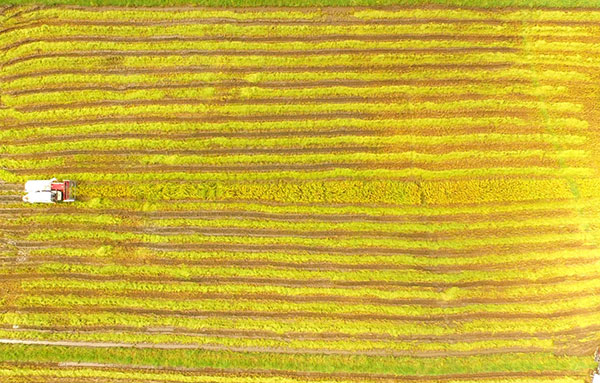Unique experiment helps turn wasteland into a rice bowl






There's a golden yellow hue over a paddy field at Jianglong village, Dongxing city in the southern Guangxi Zhuang autonomous region in July.
The coastal village is home to the Jing ethnic people, whose ancestors were said to have migrated from Vietnam about 500 years ago and settled on islands off the coast of Dongxing.
The villagers are busy harvesting rice. "We could produce 200,000 kilograms (of the unhusked rice) this season," says Liu Fuzhen, who is in charge of the plantation known for its selenium-rich rice.
Customers from Qinzhou, in Guangdong province's Guangzhou and Zhanjiang regions have already placed orders, says Liu.
It's the first time over the past 20 years that the plantation has seen a harvest. The plantation covers an area of more than 560 mu (37.3 hectares) and used to be barren salinealkali soil, which is typical of the area.
The farmland used to be too saline and acidic after being soaked in seawater, which made it difficult for crops to grow.
But in 2017, Liu decided to find ways to make use of it. She found land experts to conduct studies on the land, which turned out to be rich in selenium.
Liu then felt that it would be ideal to grow premium rice, if other undesirable soil conditions could be addressed. She contacted Wu Qiang, an agriculture expert, to help her.
Wu then led a team and came up with a complex fertilizer therapy, involving microorganisms and compound fertilizers, to change the soil structure and inject nutrients back to the soil.
In 2018, the optimization plan paid off. Liu then signed land leasing agreements with 600 local households and began to execute her plan to grow selenium-rich rice.
Her project is the first of its kind in Dongxing. And according to the agreement signed with the locals, each household gets 500 yuan ($72.7) per mu as rent, while job opportunities at the plantation are offered to villagers who have trouble making ends meet.
"We cannot only get a rental but work on the farmland," says a local villager surnamed Chen. "It allows me to take care of the old and my children, while increasing my family income," he adds.
Currently, Liu is thinking of expanding her project in Jianglong village to the rest of Dongxing, which still has about 2,000 mu of saline-alkali soil.
The idea is to attract more young people to return by giving them agricultural expertise through free technical training.
































